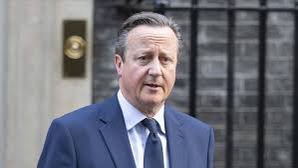UK’s Cameron seeks calm on Lebanon-Israel border in Beirut talks

British Foreign Minister David Cameron held talks with Lebanese Prime Minister Najib Mikati in Beirut on Thursday to address the intensifying conflict on the Lebanon-Israel border. The talks centered around defusing the near-daily exchanges of fire between Israel and the Lebanese militant group Hezbollah, a Hamas ally, in the wake of the ongoing war between Hamas and Israel since October 7.
The discussions between Cameron and Mikati focused on strategies to restore calm in southern Lebanon, emphasizing the need for a political and diplomatic resolution to the escalating crisis. One key aspect of their dialogue was the reinforcement of United Nations Security Council Resolution 1701, which played a pivotal role in ending the 2006 war between Israel and Hezbollah.
Resolution 1701 stipulates the withdrawal of all armed personnel north of the Litani River, approximately 30 kilometers (20 miles) from the border, excluding Lebanese state security forces and UN peacekeepers. Despite Hezbollah not maintaining a visible military presence in the border area since 2006, concerns persist over the group’s influence in the region, marked by tunnels, hideouts, and occasional missile and drone attacks into Israel.
Prime Minister Mikati reiterated Lebanon’s commitment to a peaceful solution, supporting the strict implementation of international resolutions, particularly Resolution 1701. The talks also involved discussions on ways to implement the resolution and seek a diplomatic resolution to the ongoing tensions.
Cameron’s visit to Beirut is part of a series of visits by Western ministers amid growing concerns that the Gaza war might trigger a broader conflict involving Iranian allies across the Middle East. Diplomats, including British officials, are actively pushing for a comprehensive solution that involves fully implementing Resolution 1701 and strengthening the role of UN peacekeeping forces in Lebanon (UNIFIL).
The situation remains complex, with a Western diplomat acknowledging the potential for Israel to escalate tensions due to internal political pressure. However, Hezbollah, while signaling a willingness to endorse a diplomatic solution, has conditioned it on Israel ending its Gaza war.
Despite these diplomatic efforts, tensions persist on the ground, as indicated by Hezbollah’s reported intensification of operations in response to perceived Israeli escalation. Israeli Defense Minister Yoav Gallant’s recent statement indicating imminent military action near the Lebanese border further adds to the uncertainty.
As the conflict continues, the toll on both sides is alarming, with nearly four months of cross-border fire resulting in over 210 casualties in Lebanon, including Hezbollah fighters and civilians. On the Israeli side, nine soldiers and six civilians have lost their lives, highlighting the urgency for a diplomatic breakthrough to prevent further bloodshed.












